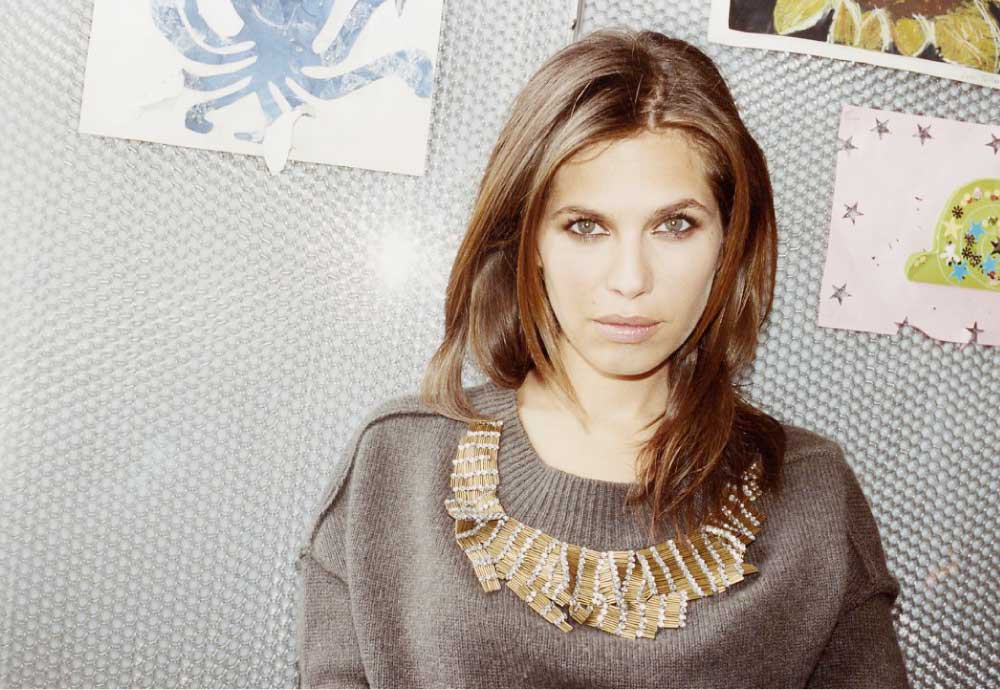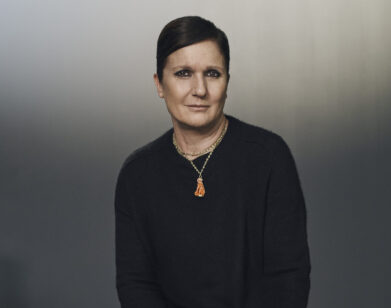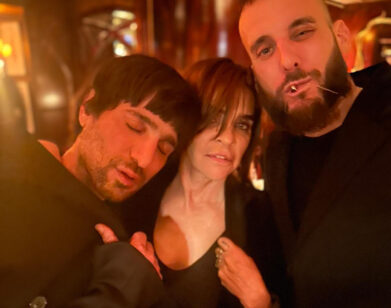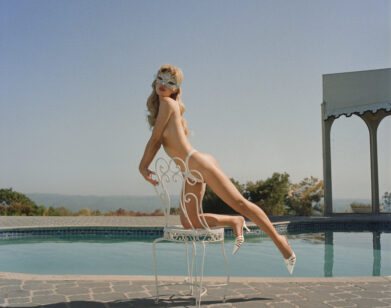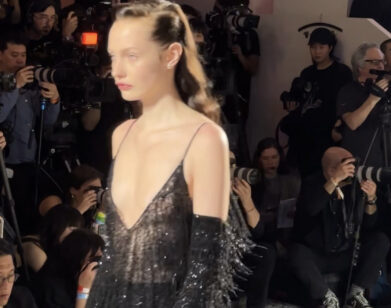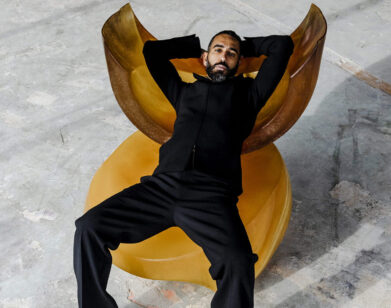Dasha Zhukova
To many, Dasha Zhukova came out of nowhere. That’s because, until recently, the 28-year-old art patron, fashion designer, museum founder, and newly anointed editor in chief of Pop magazine was just another wealthy Russian girl schlepping a croc Birkin around London in a chauffeured Mercedes. Sure, she may have been spotted at a few events in years past, but she was rarely pursued. A little bit of pre-2008 photo research results in only a few images, namely from when she dated a certain Russian tennis player who for a time was ranked number one in the world. Today, the tennis-player boyfriend is gone, and in his place is 42-year-old Roman Abramovich, the Russian oligarch who Vanity Fair ranked number eight on last year’s list of most powerful people.
And last summer, Zhukova did something that spurred her from quiet rich-girl-dom. She opened the Center for Contemporary Culture in Moscow, more familiarly known as The Garage, since it’s housed in a renovated 1920s bus depot. Suddenly, Dasha (which is an affectionate -Russian diminutive of Daria) was everywhere: famously hiring Amy Winehouse to perform at the opening party for The Garage in June 2008; joining the committee of the Serpentine Gallery in London and sprucing up their annual fundraiser in September; hobnobbing with Larry Gagosian at a gallery opening in Rome in February; sitting front row during Paris Fashion Week in March . . .
The girl’s status has changed indeed: Now paparazzi run after her in New York. The interest in Zhukova—who readily admits that while she has houses in Moscow and London, she spends most of her time on a plane—isn’t exactly a mystery. She blossomed at a time when many were looking to MotherRussia as a new world power player, and as an attractive entrepreneur, she’s been labeled one of Russia’s rich new things. There are those who speculated that the reason she found Abramovich so attractive was his wallet. But Zhukova’s father, who owned oil companies before diversifying, was also an oligarch. The Garage is the first contemporary art museum of its magnitude in Moscow, with an opening show of the Russian artists Ilya and EmiliaKabakov, followed by the wildly impressive François Pinault collection and a collaboration between David Lynch and Christian Louboutin. And last but not least, Zhukova looks like a million bucks (or a billion rubles).
What is so endearing about Zhukova, however, is that while many of life’s pleasures stare her squarely in the face, she has remained down-to-earth. During the course of this interview, which was conducted in the bar at the Ritz in Paris, Lily Allen slurred by the table and feigned horror that this conversation was being recorded since she was occupying the next booth over. Zhukova decided she liked Allen. “I just read the interview that Damien [Hirst] did with her,” Zhukova explained, referring to the February issue of this magazine. “And she’s funny. It was so refreshing to finally hear a girl not denying that she likes a good time. I cannot listen to another girl say, ‘I’m not a party girl. I just happen to always get photographed falling on the floor with lipstick all over my face and a bottle of champagne sticking out of my bag.’” For the record, Zhukova had champagne during this interview, and moved on to vodka later that evening.Derek Blasberg: I have to say, you’re not at all what I thought you would be like.
Dasha Zhukova: That sounds offensive.
Blasberg: No! I don’t mean it in a bad way. But when you hear of a rich, powerful Russian woman, you don’t necessarily think sweet and approachable . . .
Zhukova: Who do you think of?
Blasberg: A James Bond villain. I thought you’d have an accent and that you would be really cold and definitely be wearing hooker heels. I thought you’d be mean to people and wouldn’t smile and that you’d wear really tight pencil skirts. You know, the stereotype.
Zhukova: Yes, but that is so outdated. I think it has a lot to do with Russia’s history, the reality of being a woman there, and the way that past generations of women had to fend for themselves. Women in my grandmother’s generation really had to rise to the occasion during the war. They were tough because they had to be.
Blasberg: Is the new Russian woman more chilled out?
Zhukova: Well, let’s steer clear of generalizing—it’s a whole nation of people. I do think that the new generation isn’t as hard as previous ones. But they will have their own problems. There’s this surge of new money, so those kids will be faced with something different.
Blasberg: How do you feel when people classify you as a symbol of this newly minted Russia?
Zhukova: The thing is, I grew up in L.A., so I had this unique opportunity to live in both communist Russia and see that life, and then move to
America as a young girl and experience a completely different life. I don’t really feel like I’m part of that category of new Russians.
Blasberg: What were some of the big differences when you came to California?
Zhukova: Before I was in California, I was in Houston, Texas. That was crazy. The very first meal I had in the U.S. was Froot Loops, and I was like, “What is this? We do not eat colorful circles for breakfast.” I was used to pancakes with meat stuffed in them. Everything was different.
Blasberg: Wait, why were you in Houston?
Zhukova: My mom, who is divorced from my father, is a molecular biologist. She really didn’t like what was happening in the medical community in Russia and the attitude toward the scientists. Once communism fell, to really make a living you would have to deal, essentially, with hustlers. Everything was up for grabs, and the hierarchy shifted so dramatically that my mother couldn’t find a place for herself where she was comfortable. Before, it was an educated group—the intelligentsia—and then suddenly you needed a whole different set of skills to survive. She just didn’t feel like she wanted to be a part of that, so she got a job in Houston because we had family there. I had no choice in the matter.
Blasberg: You went for the Fruit Loops.
Zhukova: Exactly. I did feel like I was going to Disneyland the whole time.
Blasberg: Why?
Zhukova: I guess that was the limited information about America I had growing up. You think of Mickey Mouse waiting for you when you get off the plane. And then, after being in Houston for two years, we moved to L.A.
Blasberg: How did you like California?
Zhukova: I actually fought my mom about moving. When she told me, I was so angry because I thought Houston was the best place on earth. I even threatened to divorce her, to be an emancipated minor, if she tried to move me. I think I was 12. But, obviously, I liked California once I got there. Blasberg: You stayed in California for a while, from middle school to university.
Zhukova: Yes, I went to UC Santa Barbara. It was amazing, maybe one of the most fun experiences in my life thus far. It was a totally stereotypical American experience.
Blasberg: What did you study at UC again? I sometimes forget how brainy you are.
Zhukova: I did pre-med, Slavic studies, and literature. Basically, it was a lot of science classes, with a bit of Russian.
Blasberg: While you were studying, were you going back to Moscow often?
Zhukova: No. I hadn’t been to Russia in about a decade at that point. I went my junior year of college. My father had moved back, so I went to see him. It was fun. I never in a million years would have thought about moving back to Moscow. But in my last year of college, I decided that I didn’t want to stay in L.A. I wanted a change. So I did my last semester abroad in Russia.
Blasberg: And you liked it?
Zhukova: I did. And I debated moving to Moscow permanently. But I had started this clothing company [Kova & T, a Los Angeles–based line] with my friend Christina [Tang]. I had met Christina in middle school, and we had been friends the entire time I lived in California.
Blasberg: Did people discourage you from doing a clothing line?
Zhukova: Completely. Actually, I feel like anything I’ve ever done, I’ve been strongly advised not to do.
Blasberg: By people in the industry? Or by friends?
Zhukova: Everyone. It was more people telling me, “You don’t want to get into this industry. You don’t know what you’re getting yourself into. You don’t want to make this your future.”
Blasberg: You didn’t listen to them, I see. So you’re doing this business from L.A. and Moscow. How did you get to London then?
Zhukova: I knew I wanted to do something in the medical field, so I moved to London to study homeopathic medicine. England has a long history of supporting alternative medicine—maybe it’s because they don’t have such a strong pharmaceutical industry in England, and homeopathy has been taught and promoted there for hundreds of years. So I moved to London, but I was going back to Moscow a lot.
Blasberg: Who were you hanging out with in Moscow?
Zhukova: I was spending loads of time with my father and brothers, and I had a Russian boyfriend at the time—a tennis player. I’m not sure how it all happened, but a few years later, minus that boyfriend and plus a new one, I started living in London full-time.
Blasberg: A new boyfriend always helps. Is that the current boyfriend, Roman Abramovich? You met him in London?
Zhukova: I had known him for some time.
Blasberg: Where does he live?
Zhukova: Moscow. Blasberg: Is that how you got involved with founding a museum there? How do you go from homeopathic medicine to the creative arts?
Zhukova: What happened with the museum was I walked into this amazing building [a 1920s bus depot designed by Konstantin -Melnikov] and learned that some people were interested in turning it into a creative space. They didn’t really have the time or the dedication to do the project, but I thought it was a great idea. Basically, I thought if they were in charge, it wouldn’t reach its full potential, so I decided I would do it. I figured I would have a better grasp of what could be done there, and I could put together a group that would really do it well. I loved the space—the minute I walked into the building that is now The Garage, I had a vision of what it could be. Nine months later, Amy Winehouse was singing at the opening.
Blasberg: I was there that night. It was surreal, man. I was in the front row getting yelled at for rolling around on the stage . . . so embarrassing.
Zhukova: We were just talking about that weekend. No one thought that she would show up. I must have had a whole patch of gray hair, stressing and wondering if she would make it. I’m still surprised she ended up coming.
Blasberg: Did you meet her?
Zhukova: Of course. She was extremely sweet.
Blasberg: So now you’re fully entrenched in the art world. How did you become interested in contemporary art?
Zhukova: My father had always been interested in architecture, and particularly contemporary art, which was kind of unusual for a -Russian man his age. So I was exposed in that manner. In Russia, generally speaking, there’s a prevalence of impressionism, and other -periods that are pretty textbook genres. My dad was super-involved in the architecture of his homes, and he always had cool stuff hanging on the walls. And I’ve always had a lot of friends involved in the arts, many are young artists. So it was combination of these things. And then the museum opportunity came up, so I dove into it. The more I learned, the more I liked it.
Blasberg: Did you enjoy planning The Garage?
Zhukova: Planning is my favorite—to have a vision and watch it materialize. I’ve been really pleased with the exhibitions we’ve had so far, like the Kabakov exhibit last fall, and then François Pinault’s collection of Damien Hirsts, Jeff Koonses, and other amazing pieces, which is up now. I’m very excited about developing The Garage as a cultural center.
Blasberg: Proliferating the creative arts to the Russian people!
Zhukova: Yes. I think it’s so important what kids are exposed to, even on a subconscious level. And with Russia being culturally isolated for so long, it needs a place like this. We have a strong focus on education, and we’re putting together art classes and master classes, lectures for both kids and adults. We’re going for the kids, the grown-ups, the grandparents, the whole family! Even for the people who think that they hate contemporary art. There is some skepticism
of contemporary art in Russia.
Blasberg: Who is helping you with this? I’ve seen you with Larry Gagosian a lot.
Zhukova: He’s just a friend. He’s not affiliated with the museum.
Blasberg: I’m not saying he was, but I have noticed that there are some members of the art community, the more established types, who traditionally don’t take an immediate liking to younger members, but who have taken a real shine to you.
Zhukova: There are other contemporary art museums in Moscow, but there’s not one that’s really internationally contemporary. So I think a lot of artists, gallerists, and collectors have come to Moscow and wanted to do shows, and I think many people in the art community wanted to reach out to the Russian audience, but there hasn’t been an opportunity. So this is an opportunity for them, and consequently they’ve been very supportive of it—and of me.
Blasberg: Have you had any bad experiences? Has anyone been nasty to you?
Zhukova: No, not yet. I guess people wouldn’t say nasty things to my face.
Blasberg: Oh, probably not. But definitely behind your back.
Zhukova: That was the nice thing about not being from the art world, or in the thick of it for a long time. When you’re kind of isolated, you don’t really hear the gossip, or you’re not really involved in it. You’re here, and it’s all going on over there. Blasberg: When you were studying homeopathic medicine, did you ever anticipate that you would become gossip-column fodder?
Zhukova: No. Full stop. And, for the record, I don’t see myself as gossip-column fodder.
Blasberg: But that’s what makes you such an endearing young woman. You’re completely unaware of the shallow opportunities that could await you—especially now that you’re the editor of Pop.
Zhukova: I guess that made me a little bit of -gossip-column fodder for a second.
Blasberg: We can get into Pop in a minute, but some of the stuff that was reported was wrong, right?
Zhukova: Yeah, there were all these silly rumors flying around. I just heard one this morning that I had bought Pop, which is ridiculous. Why would I buy Pop? I’m the editor, and I’m getting a paycheck—it’s as simple as that.
Blasberg: Do you read the stuff about you?
Zhukova: Yeah, sometimes I see it. And sometimes I think it’s unfairly mean. But people have the freedom to say what they want, and I get it—mean stuff sells better than nice stuff.
Blasberg: So you’re not in the bathroom crying, beating your head against the wall, screaming, “This isn’t what I asked for!”
Zhukova: No—not yet anyway. If a stranger is writing something completely fictitious, or insulting me on a blog or a tabloid, I don’t take it personally. But the press hasn’t been bad to me, so let’s not make me sound like a martyr. I mean, they called me a socialite a few times . . .
Blasberg: How dare they!
Zhukova: And they doubted my credibility as an art connoisseur. But I don’t have a background in art, so I get that. And, yeah, I do go to parties. I like a good party. So I understand where it all comes from.
Blasberg: They also doubted your ability to edit a magazine.
Zhukova: Yes, there was a lot of doubt there. But here’s the thing: I’ve wanted to do a magazine for years. In fact, my friend Olympia Scarry and I had worked on a magazine concept before. We did up a dummy version, and even looked to get it printed. It was not like Pop. We had only planned on a single issue a year, and the layout was different. But when this opportunity came along—an entire magazine ready to go and fully staffed, with an entire infrastructure—eventually I decided it would be stupid not to at least entertain the idea.
Blasberg: What was your initial reaction?
Zhukova: My initial reaction was, “No way. I don’t want this.”
Blasberg: Why, because you didn’t want to take over someone else’s magazine?
Zhukova: Not even that. That’s another thing: I read fashion magazines, but I’m not all up in the mix. I’m not from this world. I haven’t spent years in fashion making friends and making enemies. I barely know who half the people are. Obviously, I know that Katie Grand started Pop, and that it’s a product that’s so associated with her in this world. But in my world, it’s just Pop.
Blasberg: Do you think it’s advantageous that you’re only half in these worlds, then? Not too into the drama of art or fashion?
Zhukova: Absolutely. It allows me to not delve too deep into the politics of it all. I like to think of myself as the average reader. Blasberg: And you’re not trying to cash in on someone else’s legacy?
Zhukova: No, I’m not. I respect Katie Grand, and I hope I can retain some respect for the brand. But I have other plans for the magazine now. And, come on, it’s not like this is the first time there’s been a new editor at a magazine.
Blasberg: American Vogue is more than 100 years old, and there have been quite a few betties at the helm of that title. Let’s move on: How was the YSL auction? Were you interested in that sale because you like auctions?
Zhukova: Nope, because I like YSL. I don’t like auctions. In fact, I’d never been to a live auction.
Blasberg: But the YSL auction was outrageous. I saw Betty Catroux the other night and she told me she was still impressed by his stuff. “Not a single piece of junk,” she told me.
Zhukova: She was right. I’m sure Christie’s was very pleased. Everything in that collection was great. But that’s what YSL was known for—the perfect aesthetic.
Blasberg: What about you: When you kick it, what will be on the auction block?
Zhukova: That’s horrible! Hopefully I won’t kick it for, like, 60 more years. But when I do, you can have what you want. Do you write wills?
Blasberg: No. I have nothing to will to anyone!
Zhukova: Well, I don’t have that much to give at this point either.
Blasberg: But I have thought, If I died tomorrow, who would get what little I have?
Zhukova: Who would get all those flossy three-piece suits? I would want that tie you’re wearing. I love polka dots.
Blasberg: Deal. Then what would I get from you?
Zhukova: What would you want of mine? I know! You could have my collection of anatomy DVDs, which is one of my most sacred possessions. You don’t know how rare that is—every organ of the human body explained by a genius.
Blasberg: I would much rather have a Francis Bacon, Dasha.
Zhukova: I can’t comment on the Bacons.
Derek Blasberg is a New York–based fashion journalist and writer. He is one of V Magazine’s senior editors anda contributing editor at style.com.

